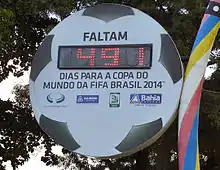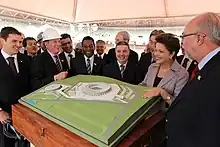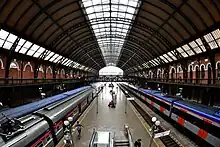2014 FIFA World Cup preparations
The 2014 FIFA World Cup tournament in Brazil cost US$11.6 billion,[1] and was the most expensive World Cup at the time.[2] It was surpassed by the 2018 FIFA World Cup, however, which cost an estimated $14.2 billion.[1] FIFA spent an estimated $2 billion on the 2014 finals,[3] with its greatest single expense $576 million in prize money.[4] Other expenditures were largely for stadium renovation and other infrastructure projects, since Brazil undertook substantial construction to facilitate hosting the tournament.[5][6]

Brazilian investment
Stadiums

Although the organisers originally estimated costs of $1.1 billion,[7] $3.6 billion was reportedly spent on stadium work.[8][9] Five host cities built venues for the World Cup. The Estádio Nacional Mané Garrincha stadium in Brasilia (the capital) was demolished and rebuilt, and six were renovated.[10] Maracanã Stadium in Rio de Janeiro, which held the attendance record for a FIFA World Cup final match (199,854), was the largest stadium and hosted the final. The CBF originally intended to host the opening match at São Paulo's Estádio do Morumbi, but was replaced in 2010 by the Arena Corinthians after it failed to financially guarantee required improvements.[11]
The first new stadium, the Castelão, in Fortaleza, opened in January 2013.[12] Six venues were used for the 2013 Confederations Cup,[13] but six additional stadiums missed FIFA's 31 December 2013 completion deadline.[14] The completion of the new Arena Corinthians was hampered by a fatal crane collapse in November 2013 which destroyed part of the stadium and killed two construction workers.[15] Slow progress at the Arena da Baixada in Curitiba made FIFA threaten to drop the stadium as a host venue in January 2014 unless significant progress was made during the following month;[16] after satisfactory progress, FIFA confirmed that Curitiba would remain a host city.[17]
During the first quarter of 2014, the first games were held at venues in Manaus[18] (Arena da Amazônia), Natal[19] and Porto Alegre.[20] After inspecting all the venues in May 2014, FIFA secretary Jérôme Valcke expressed concerns about the readiness of the Natal, Porto Alegre and São Paulo venues and required additional test events.[21] Brazil's Deputy Sports Minister, Luis Fernandes, replied that there was "no panic".[22]
Infrastructure projects
In January 2010, the Brazilian federal government estimated that hosting the tournament would require a government investment of $11 billion.[23] The government announced tax breaks for construction and renovation of stadiums for the World Cup; host cities would be exempt from VAT,[24] and FIFA spending in Brazil would be tax-free.[25]
The government earmarked R$3 billion (€1.8 billion, or £1.1 billion) for investment in projects related to the World Cup, and introduced a World Cup PAC.[26] In March 2007, Brazil announced an additional PAC investment of $526 billion from 2011 to 2014.[27]
Airports were identified as "the big problem" by the tournament's organizing committee,[28] and experts said that Brazil's airports needed considerable renovation and expansion to accommodate those arriving for the World Cup.[29] An estimated 600,000 people flew to the tournament, and three million traveled by air between matches.[30] Legislation was introduced to enable Infraero, Brazil's airport operator, to facilitate airport improvements.[31] The government had problems implementing infrastructure legislation,[32] and forecast in 2011 that 10 of the 13 terminals scheduled for upgrading were unlikely to be completed by 2014.[33] President Dilma Rousseff said that the government would make "a strong intervention" to ensure that the airports were ready, however, including private investment;[33] management of three airports was transferred to the private sector in 2013 for $10.8 billion.[34]

Major infrastructure projects were implemented across the country on roads, light rail and bus rapid transit lines connecting Brazil's airports to its city centres and stadiums; an estimated 4,300 kilometres (2,700 mi) of highways were improved.[35] To host the increased number of tourists, the Brazilian Development Bank (BNDES) provided a budget of R$2 billion to modernise and increase the country's hotel network.[36] In Rio de Janeiro, the improvements also anticipated the 2016 Summer Olympics.[37]
Planned projects such as monorail systems in Manaus and São Paulo and a subway system in Belo Horizonte were cancelled, and others were not expected to be finished before the World Cup; other projects were downsized.[38][39][40][41] In May 2014, it was reported that 36 of the planned 93 major projects were completed.[42] FIFA secretary-general Jérôme Valcke defended the progress, saying that "it was clear from the beginning not all the projects would be ready ... these projects were part of a government plan that goes far beyond the World Cup",[43] and the organization pledged to spend at least $20 million on "legacy projects" in Brazil after the tournament.[44]
The government's failure to complete all the originally-planned projects was criticised by some Brazilians, who also opposed its investment in the World Cup. An opinion poll by Datafolha two months before the start of the tournament indicated that 48 percent of respondents supported the tournament, a decline from 79 percent in 2008;[45] 55 percent of respondents said that the event would be a net negative for Brazil.[46] According to FIFA President Sepp Blatter, "Brazilians are a bit discontented because they were promised a lot".[46]
Footballer-turned-politician Romário criticised his country's handling of the preparations and said that "FIFA's requirements were excessive".[47] Ronaldo, another former Brazilian player, said that he was "embarrassed" by the state of the country's infrastructure and that "a series of investments were promised that won't be delivered - only 30 percent will be delivered".[48]
According to a group of German economists, hosting a sports event of this magnitude by a newly industrialized country like Brazil or Russia was an economic luxury. They suggested two measures to make such events sustainable: building less and economic support from the organizing associations. Large stadiums and streets were unused after an event, negatively impacting the ratio of investment to assets. For this reason, the group feared that Olympic Games and football world championships would only be hosted in countries with authoritarian regimes.[49][50][51][52][53][54][55][56]
Security

The Brazilian government pledged $900 million for security forces, and said that the World Cup would be "one of the most protected sports events in history".[57] The government planned to have one police officer for every 50 people attending matches, and one for every 80 people at viewing events around the country.[57]
Investments in security measures such as facial recognition systems and unmanned security robots were made.[58] An integrated security plan was developed which sought information about potential terrorists and troublemakers.[59] A total of 150,000 public security professionals and military was planned to ensure security, along with 20,000 private security personnel.[60]
Security concerns increased after protests during Brazil's staging of the 2013 FIFA Confederations Cup, in which disturbances occurred outside stadiums.[61][4] Protesters cited the amount of public money being invested by the Brazilian government in the World Cup at the expense of social services for its population.[62][63][64]
Human cost
The projected financial cost to the Brazilian government was estimated at $14 billion.[2] In May 2014 in Brasília, the nation's capital, indigenous protesters clashed with police on horseback during a protest of the World Cup; one policeman shot in the leg, and police fired tear gas into the crowd to disperse the protest.[65] An indigenous population of 10 to 20 of Brazil's 300 ethnic groups was evicted from an abandoned museum next to Maracanã Stadium in Rio de Janeiro, reportedly for the construction of a parking lot.[65]
FIFA investment
FIFA forecast that it would spend $2 billion to stage the 2014 World Cup Final.[6]
Statistics
| Host | General cost |
|---|---|
| US$14.2 billion[1] | |
| US$11.6 billion[1] | |
| $6 billion | |
| $5 billion | |
| $5 billion [70] | |
| $4 billion | |
| $340 million | |
| $30 million |
References
- Непредвиденные расходы: как менялась смета ЧМ-2018 08 ИЮН, 07:01, RBC
- "World Cup set to be most lucrative ever". ESPN. 23 May 2014.
- Dunbar, Graham (22 May 2014). "Record World Cup numbers game for FIFA, Brazil". USA Today.
- "Brazil unrest: 'Million' join protests in 100 cities". BBC News. 21 June 2013.
- Beary, Brian (7 June 2011). "Brazil on the Rise". CQ Global Researcher. 5 (11): 265.
- "Record World Cup numbers game for FIFA, Brazil". USA Today. 22 May 2014.
- "FIFA's Inspection Report" (PDF). Archived from the original (PDF) on 31 October 2007. Retrieved 9 October 2011.
- "Corruption to blame for some Brazil World Cup cost rises". Bloomberg. 23 May 2014. Archived from the original on 18 June 2014.
- "Brazil World Cup stadiums on track, but costs soar". Reuters. 3 April 2012.
- "2014 Fifa World Cup: Where are the 12 host stadiums in Brazil?". BBC. 3 December 2013.
- "Sao Paulo dropped for 2014". SBS. 17 June 2010. Archived from the original on 28 June 2010. Retrieved 17 June 2010.
- "Brazil's first 2014 World Cup stadium holds matches". NewVision. 28 January 2013. Archived from the original on 26 February 2015. Retrieved 30 January 2013.
- "Destination: Stadiums". FIFA. 15 June 2013. Archived from the original on 7 February 2009.
- "Brazil World Cup: Six stadiums to miss FIFA deadline". BBC. 5 December 2013.
- "Two die in Brazil World Cup stadium accident". BBC. 27 November 2013.
- "World Cup venue in southern Brazil in danger of not being ready; FIFA's Valcke gives ultimatum". Fox News Channel. Retrieved 22 January 2014.
- "Curitiba to stay as World Cup venue in Brazil". ESPN.co.uk. 18 February 2014. Archived from the original on 26 February 2015. Retrieved 2 June 2014.
- "Nacional empata com o Remo e é eliminado da Copa Verde" (in Portuguese). 9 March 2014. Archived from the original on 24 July 2014.
- "Arena das Dunas é inaugurada com festa e vitórias de América-RN e ABC" (in Portuguese). 26 January 2014.
- "O Gigante voltou: após mais de 1 ano, Inter revê Beira-Rio e goleia o Caxias" (in Portuguese). 15 February 2014.
- "After final inspection, 3 Brazil World Cup stadiums worry FIFA". Fox Sports. 29 May 2014.
- "Transcript of conference call - Brazil Deputy Minister of Sport Luis Fernandes". copa2014. 29 May 2014. Archived from the original on 3 June 2014. Retrieved 2 June 2014.
- "Swiss Re Says Brazil Spending for World Cup, Olympics Means More Revenue". Bloomberg L.P. 8 April 2010.
- "Brazil shall grant tax breaks for 2014 stadiums". Portal 2014. 18 May 2010. Archived from the original on 26 May 2010. Retrieved 30 October 2007.
- "World Cup: To tax or not to tax?". BBC News. 11 May 2010.
- "FIFA World Cup 2014 host cities to receive US$ 1.5 billion". Brazil-Arab News Agency. 22 July 2009. Archived from the original on 1 July 2014. Retrieved 2 June 2014.
- Noto, Anthony (1 February 2012). "Brazil Needs to Pump Up for Olympics, World Cup; The Latin American M&A leader lacks the basic infrastructure needed to support the fans headed there for the 2014 World Cup and the 2016 Summer Olympics". Mergers and Acquisitions, the Dealmaker's Journal. 47 (2): 46.
- "Airports: the headache of the 2014 World Cup". CONMEBOL.com. 15 April 2013. Archived from the original on 5 July 2017. Retrieved 2 June 2014.
- Williamson, Lauren (October 2010). "The Brazil Report". Inside Counsel.
- "Poor travel options to test 600,000 foreign fans who flock to Brazil for World Cup". Fox Sports. 3 December 2013.
- "Law reduces bureaucracy of airports building". v-brazil.com. 8 June 2010. Archived from the original on 16 August 2014.
- "Spotlight Shifts to Brazil 2014". Aljazeera.net.
- "Brazil's airports 'not ready for World Cup 2014'". BBC. 15 April 2011.
- "Airport auction tests readiness for World Cup: Corporate Brazil". Bloomberg. 19 November 2013.
- "Sustainable Brazil: Social & Economic Impacts of the 2014 World Cup" (PDF). Ernst & Young. 2011. p. 13. Archived from the original (PDF) on 4 August 2014. Retrieved 2 June 2014.
- "Brazilian Development Bank extends financing programme for the hotel sector". copa2014. 28 September 2012. Archived from the original on 31 May 2014. Retrieved 2 June 2014.
- "422 Hotels to be built in Brazil ahead of 2016 Olympics". Fox News Channel. 22 November 2013. Archived from the original on 8 March 2014. Retrieved 2 June 2014.
- "Failed World Cup projects producing rally for Marcopolo". Bloomberg. 27 March 2013.
- "Brazil's World Cup a broken promise". Journal Gazette. 17 March 2014. Archived from the original on 16 November 2017. Retrieved 2 June 2014.
- "VLT linha 1-trecho 1 (Aeroporto/Terminal Asa Sul)" (in Portuguese). Archived from the original on 13 June 2012. Retrieved 5 October 2012.
- "VLT Cuiabá/Várzea Grande" (in Portuguese). Archived from the original on 19 May 2012. Retrieved 5 October 2012.
- "World Cup protests threaten Brazil's economy and its image". Reuters. 21 May 2014.
- Bowater, Donna (4 March 2014). "There are 100 days to the start of the big show – will Brazil be ready?". The Telegraph.
- "FIFA launches 2014 FIFA World Cup Legacy Trust". FIFA. 5 December 2013. Archived from the original on 15 April 2014.
- "Less than half of Brazilians favor hosting World Cup, poll shows". Reuters. 8 April 2014.
- "There are 100 days to the start of the big show – will Brazil be ready?". USA Today. 27 May 2014.
- "The social cost of Brazil hosting World Cup 2014". Bleacher Report. 6 June 2013.
- "Fifa concern about three Brazil stadiums". BBC Sport. 30 May 2014.
- Von Karl Brenke und Gert G. Wagner. "Fußball-Weltmeisterschaft 2014: Brasiliens Wirtschaft hat nichts von der Fußball-WM - Wirtschaft - Tagesspiegel" [World Cup 2014: Brazil's economy gains nothing from the World Cup - Economy - Tagesspiegel] (in German). Tagesspiegel.de. Retrieved 7 June 2014.
- "Stimmung im Land gemischt - news.ORF.at" [Voices in the Land are Mixed] (in German). Orf.at. 7 June 2014. Retrieved 7 June 2014.
- "World Cup: pain and passion in Brazil". Afr.com. Archived from the original on 26 February 2015. Retrieved 7 June 2014.
- "A fair World Cup deal for Brazil? - CNN.com". Edition.cnn.com. Retrieved 7 June 2014.
- "What The World Cup Will Do To Brazil's Economy". Worldcrunch.com. 7 January 2014. Archived from the original on 3 March 2016. Retrieved 7 June 2014.
- "After Using Over $500 Million in Taxpayer Money To Build Sports Stadiums, Cincinnati Forced To Sell Off Local Hospital". Archived from the original on 14 July 2016. Retrieved 7 June 2014.
- "World Cup 2014 leaves Brazil costly stadiums, poor public transport - Economic Times". Articles.economictimes.indiatimes.com. Reuters. 14 April 2014. Retrieved 7 June 2014.
- Featured Columnist (6 June 2013). "The Social Cost of Brazil Hosting World Cup 2014". Bleacher Report. Retrieved 7 June 2014.
- "Brazil boosts World Cup security budget as crime rises". CNN. 5 December 2013.
- "Brazil going to use robots to help with 2014 World Cup security". Brazil My Country. 15 May 2013. Retrieved 15 May 2013.
- "Integration is the keyword in the Strategic Security Plan". World Cup Portal. 14 September 2009. Archived from the original on 29 June 2014. Retrieved 2 June 2014.
- "Brazil's massive World Cup security forces". Sportsfan.com.au. Archived from the original on 27 February 2014. Retrieved 12 May 2014.
- "Brazil Maracana stadium protest ends in clashes". BBC News. 16 June 2013.
- "Brazil's protests raise fears for World Cup as a million take to the streets". The Guardian. 21 June 2013.
- "World Cup only benefits outsiders, say Brazil protesters". CNN. 19 June 2013.
- "In the favelas on the frontline of protest, Brazilians ask: who is this World Cup for?". The Guardian. 22 June 2013.
- "Why the World Cup Will Be Bad News for Indigenous People". Mic. Retrieved 1 December 2015.
- "2014 FIFA World Cup cost" (in Portuguese). Estadao.com.br. Archived from the original on 22 March 2014. Retrieved 12 May 2014.
- "Last World Cups costs" (in Portuguese). Futebolinterior.com.br. 28 December 2012. Archived from the original on 22 March 2014. Retrieved 12 May 2014.
- "1998 World Cup cost" (in Portuguese). Cdcc.sc.usp.br. Archived from the original on 22 March 2014. Retrieved 12 May 2014.
- "1994 World Cup cost" (PDF). Retrieved 12 May 2014.
- "Mondiali Italia '90. Sprechi, opere incompiute, mutui accesi al 2014 - WikiSpesa". Archived from the original on 15 July 2014. Retrieved 15 June 2014.

